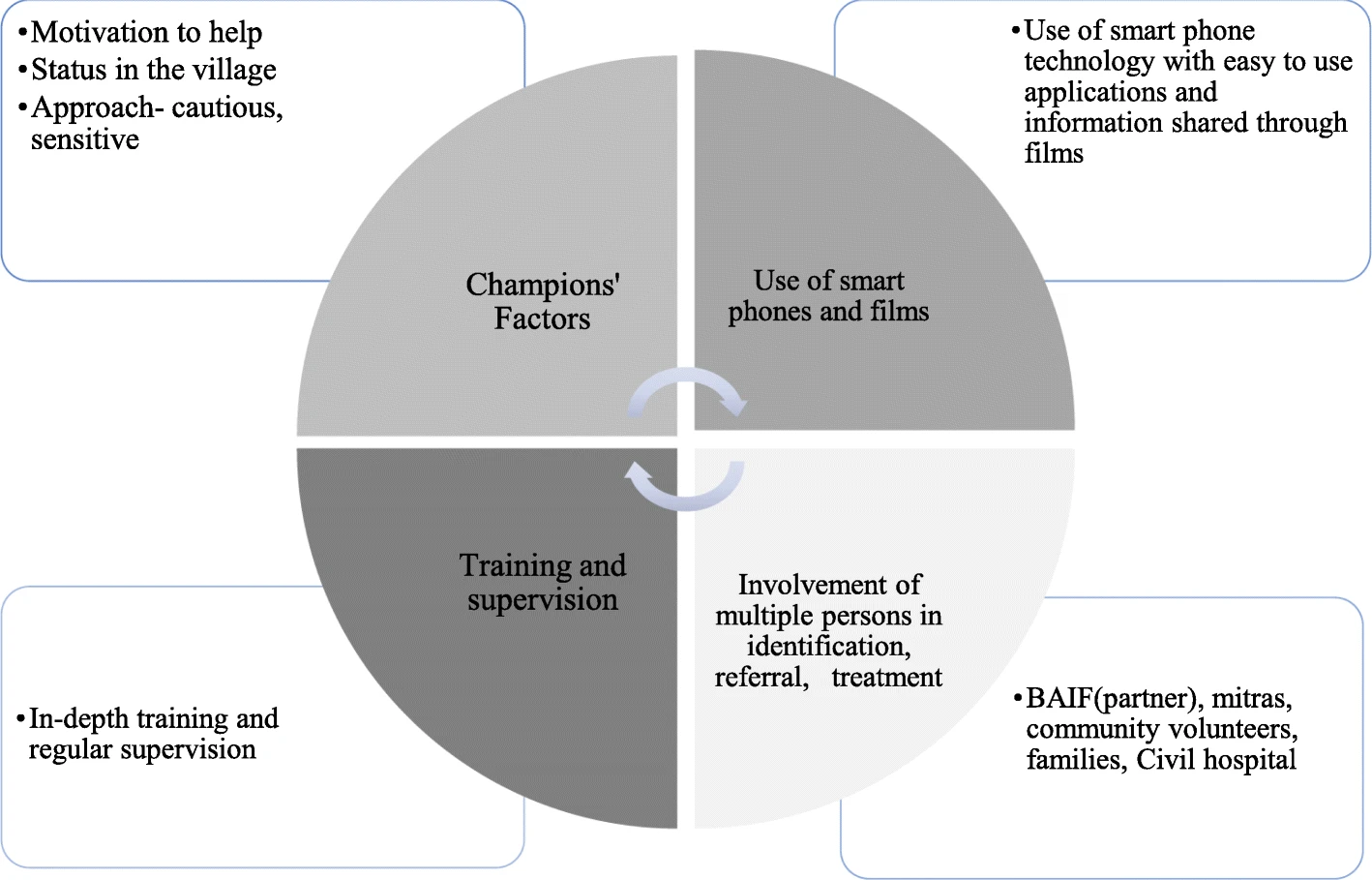Drawing upon social capital in a community to engage and empower community members to address mental health problems.
Leaving aside the perpetual pessimists and those malcontent with the system, an optimist can be found in either of the three phases, ‘Change will come,’ ‘Change is coming,’ and ‘Change was brought.’ The Atmiyata Project is a good example of the latter, of how change was and continues to be brought about. It is a good example of how awareness and adoption of mental health services increases and how people from the community ‘champion’ this change.
Spearheaded by Dr. Kaustubh Joag and team of the Centre for Mental Health Law and Policy, ILS Law College, Pune, ‘Atmiyata’, which means ‘shared compassion’ in Marathi, is an intervention that was first piloted in Nashik district, between 2013 and 2015. In February of 2020, a study published in BMC Psychiatry concluded that the Atmiyata intervention was a “feasible and acceptable approach” to reduce distress, symptoms of depression and anxiety, while also being able to facilitate access to social welfare benefits allocated by the government.
Simply stated, Atmiyata is a community-led intervention that aims to promote wellbeing and reduce the burden of mental illnesses in a community by training a core group of community members as Atmiyata Champions and Mitras. Champions undergo a 7-day training and are tasked with helping detect mental health problems, offering support in the form of counselling, identifying those in need of further treatment and thereby referring them to mental health professionals. Mitras, meaning ‘friends,’ undergo lesser training and are meant to compliment the work of Champions by helping identify distressed individuals, connecting them to Champions and spreading awareness related to wellbeing and distress within the community. Champions are also trained to help address the community’s economic issues by facilitating access to social-welfare schemes and benefits provided by the government.
Factors that played a role in Atmiyata’s success
The National Mental Health Survey, 2016, based on standardised data collected from a nationally representative sample, has found Mental Morbidity to be prevalent in 10.6% (nearly 15 crores) of India’s population. Additionally, 10.0% (nearly 13 crores) are said to be affected by Common Mental Disorders (CMDs), such as depression, anxiety disorder and substance use disorder. Close to 1% (nearly 1.3 crores) in India are affected by Severe Mental Disorders (SMDs), which are also said to be the result of prolonged ignorance and neglect.
In a country where awareness of mental disorders (common as well as severe) is yet to fully set in, Atmiyata is one of the few strategies being implemented at the grassroot level. Through voluntary participation of community members, CMDs and SMDs are being addressed and individuals are getting connected to health care services (public or private) that are available. Interviews with Atmiyata’s Champions substantiate the positive effects of the intervention, in great detail.
Challenges and Limitations of the Study
The Atmiyata intervention was not free from challenges. The communities being served were at times overly skeptical of the work being carried out by the Champions and Mitras. The process and paperwork involved in getting the social-welfare benefits was hectic, lengthy and quite arduous. Finally, the sheer amount of time invested in the volunteer work, done by Champions and Mitras, was not always sanctioned or understood by their family members. This was mainly because they were not being remunerated for their time and effort given towards this cause. It is one of the study’s many limitations, that it was not designed as an efficacy trial. Instead, the study conducted at Nashik district is a pilot study for a larger, planned research intervention, that is currently being carried out in the state of Gujarat. Among other limitations of the study, is that qualitative data from the intervention’s recipients was not collected due to logistical constraints.
On the Bright Side
Atmiyata, an innovative approach to improving access to mental health and social care in community-based settings has been funded by Grand Challenges Canada, Global Mental Health Programs and the Mariwala Health Initiative.
The proof-of-concept study was implemented in the Peth Block (under Nashik district) consisting of 41 villages and a population of 14 thousand. Now a scaled-up version of the same has been implemented in the rural Mehsana district of Gujarat covering 600 villages and a population of approximately 10 lakhs. The ultimate goal is for the Atmiyata ‘model of support’ to be made available across the state of Gujarat, a population of 32 million people.
Some key highlights of the study pilotted at Peth Block, Nashik District
A total of 59 Champions identified and counselled 1150 (8.2%) persons with CMDs. They helped identify 180 (1.3%) persons with SMDs and also managed to link 121 persons (67.2% of identified) to public health services. Champions and Mitras together helped over 1376 (9.8%) persons gain access to social welfare schemes and benefits and showed short films to 7622 (54%) persons in the local population. This was done in an attempt to raise mental health awareness and get rid of stigma associated with mental illnesses.
65% of the cases were accurately detected by the Champions as persons with CMDs, as they had a General Health Questionnaire (GHQ) score of 6+ (6 is considered a typical and reliable cut-off range with the GHQ for identifying a Common Mental Disorder). Another 29% were sub threshold cases (GHQ 4/5) and 6% were non-cases (GHQ 0–3). All the persons with distress received counselling sessions from the Champions and at the 3 months follow up, persons with GHQ scores greater than 6 (CMDs) had dropped from 65% to 36%.
Shrikanth Iyer



